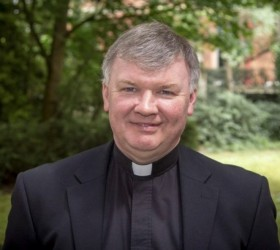Ireland: Bishop Nial Coll on Anniversary of 1916 Easter Rising

Bishop Nial Coll
Source: Irish Catholic Media Office
Bishop Niall Coll, Bishop of Ossory gave this homily during Mass on the occasion of the Annual State Commemorative Ceremonies for the 1916 Easter Rising, Arbour Hill, Dublin on 3 May.
Homily
Two fundamental duties are being observed by us this morning. First, the annual commemoration at Arbour Hill is the longest-running State ceremony to commemorate the Easter Rising. Second, we do so, as has always been important to the 1916 families, in the context of the celebration of the Eucharist, that great act of thanksgiving to God.
The Rising as we know was mainly confined to Dublin, where the 'Irish Republic … as a Sovereign Independent State' was proclaimed. And as the historian Joe Lee has observed: at the time … 'It proved a militarily gallant but hopeless enterprise in the face of the superior [crown] force', which left over 400 dead and about 3000 wounded.
You don't need me to rehearse the historical details now save to say that as the eventual coming into existence of the Republic was sealed with blood in the Rising … so too was the partition of the country by the sacrifice at the Somme …
The recent, scaled back twenty-fifth celebrations to mark the signing of the Good Friday Agreement in 1998 are testimony to the agony and the ecstasy of relationships on this island and between this island and Great Britain in the century since the Easter Rising. And, sadly, many other families, Orange and Green, know only too well the burden of the more recent trauma.
The manner in which this commemoration is being traditionally observed just now invites those of us who can, Christians and people here present of other traditions and faiths to express our hope as we recommend to God's love and mercy those who fell in 1916.
Fittingly, as I talk directly to the relatives here present, we find ourselves gathered around the altar of the Lord this morning praying for the repose of the souls of your relatives, your antecedents. Volunteers who included in their ranks a mixture of poets, playwrights, socialists, educationalists, mystics and revolutionaries (with some a blend of all of these) and so many more, men and women, young and old.
Historians debate the details of the Rising, its timing and aims. A balanced appraisal seems to indicate that it ought not be reduced, as sometimes can be the case, to an assertion of an unwavering devotion to a doctrine of blood sacrifice.
But the actions of these revolutionaries were certainly rooted in a sense of 'a higher cause' which would require the selfless sacrifice of their own lives in the cause of Irish freedom. Surely, the words of today's gospel would have touched many of their hearts and stirred their consciences: 'unless a wheat grain falls on the ground and dies, it remains a single grain; but if it dies, it yields a rich harvest'.
And I think it fair to say that there has been something of a rich harvest building gradually over the decades since independence … in terms of the economic, social, multireligious and multicultural development of Ireland …
I remember attending a lecture given by the late Taoiseach Garret Fitzgerald in Trinity College when I was a student there in the early 1990s, where in a response to a question, he opined that if Ireland had not achieved her independence, she would now be as provincial as certain peripheral regions of the UK today.
But much more is needed now and into the future to ensure a fair and equitable share in this same harvest in terms of access to education, housing, medical care and so much more. The reality of Ireland's incomplete revolution is clear to see. More needs to be done.
So, let me give the last word to Padraic Pearse and the determination and persistence which shine out from his poem 'The Fool':
I have squandered the splendid years:
Lord, if I had the years I would squander them over again,
Aye, fling them from me!
For this I have heard in my heart, that a man shall scatter, not hoard,
Shall do the deed of to-day, nor take thought of to-morrow's teen,
Shall not bargain or huxter with God; or was it a jest of Christ's
And is this my sin before men, to have taken Him at His word?
Téimis ar aghaidh le chéile agus muid lán le muinín. A Mhuire, a Mháthair na hEaglaise, guigh orainne.


















